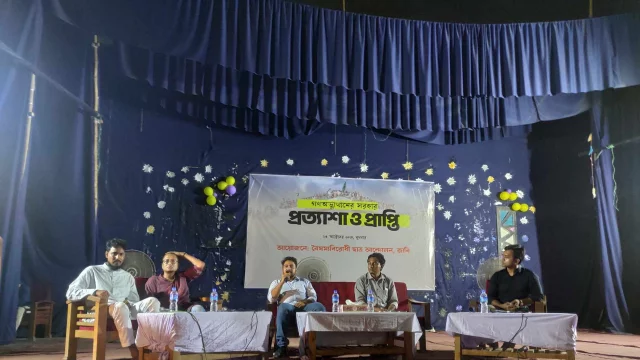

Information and Broadcasting Adviser Md Nahid Islam has said that the Awami League will never return to politics in the manner and ideology it previously adhered to.
“If it does, it would be a betrayal to the martyrs of the uprising. And certainly, as long as we are alive, we will not allow this to happen,” he said.
Nahid Islam was speaking at a discussion titled “Government of the Uprising: Expectations and Achievements,” organized by the Jahangirnagar University chapter of the Anti-Discrimination Student Movement at the Zahir Raihan Auditorium on Wednesday afternoon.
“There is no ambiguity regarding whether the ousted Awami League will have the right to participate in politics in the new Bangladesh,” Nahid Islam stated in reference to the Awami League’s political role. How can the Awami League participate in democratic politics if, as we have repeatedly done, we label them a fascist party? It shouldn’t be allowed to take part in politics if it is called fascist. People with different opinions shouldn’t label it fascist.
Highlighting the distinction between an interim government and a caretaker government, he said: “Comparing this interim government that emerged from the uprising to a caretaker government is entirely misplaced. A caretaker government takes temporary responsibility and organizes elections to transfer power. If this government does not meet the expectations of the uprising or enact fundamental reforms, the path to democratic transformation will remain obstructed. Therefore, some essential reforms are needed, including a political settlement. This will define the state’s nature, who is permitted to participate in politics, and the state’s ideology and national culture.”
He added: “We did not fight for a mere change of leadership, which cost so many lives. The goal was not to replace Sheikh Hasina with Dr Yunus. We seek systemic change so that whoever assumes power cannot become another Sheikh Hasina. The government must ensure this.”
Nahid Islam explained that the uprising, which spanned 36 days, began with demands for reforms in the quota system for government jobs, not as a political movement.
He argued that focusing solely on the 36 days would miss the larger context of the past 16 years, when the depoliticization of Bangladesh began under the One-Eleven government.
He said that this government planted the seeds of Awami fascism by bringing the Awami League to power, allowing it to secure a parliamentary majority, amend the Constitution, and gradually consolidate power. This resulted in a manipulated election process, denial of voting rights, and a crisis in human rights, marked by enforced disappearances, killings, and suppression of peaceful movements.
Akhtar Hossain, member secretary of the Jatiya Nagorik Committee, declared that drafting a new constitution has become a legal obligation. He cited Article 7(B) of the current constitution as sufficient grounds to invalidate the existing one. He also identified President Shahabuddin as a barrier to this constitutional reform.
Arif Sohel, the newly appointed Member Secretary of the Anti-Discrimination Movement’s Central Committee, spoke in favor of annulling the 1972 Constitution, criticizing its lack of public consensus and the role of leaders who had fled to India during the Liberation War, claiming they were more suited to drafting Pakistan’s constitution.
In contrast, Dr Zahed Ur Rahman, a key member of the Constitution Reform Committee and political analyst, recently described Sheikh Hasina’s ousting as a mass uprising and opposed rewriting the constitution.
Jahangirnagar University Vice-Chancellor Professor Mohammad Kamrul Ahsan stressed the importance of the reform process, saying: “If not now, it won’t be possible later.” He indicated that the primary goal of the reform process should be to organize a fair and inclusive election.
At the same event, the university’s Pro-Vice-Chancellor (Education) Professor Mahfuzur Rahman, said that university reforms would complement state reforms.